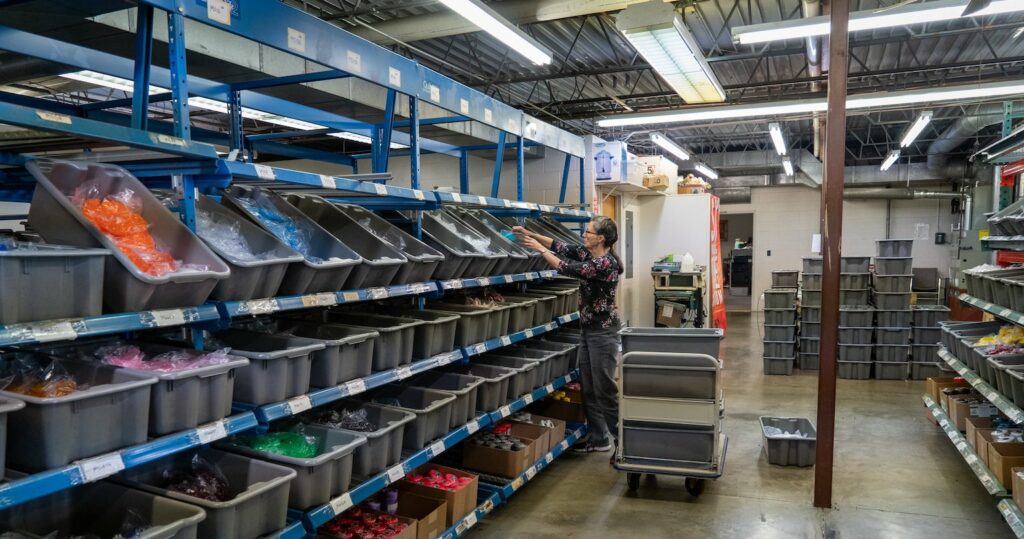LOUISVILLE — From a low brick building on a commercial stretch of highway in Louisville, Our Lady’s Rosary Makers packages enough beads and other supplies to make 6.5 million rosaries each year.
The lay apostolate was born of Xaverian Brother Sylvan Mattingly’s desire in 1949 to do something special for the Blessed Virgin Mary, said Michael Ford, who serves as its general manager.
Seven decades later, the apostolate is still providing millions of rosary-making supplies at a low cost to groups of rosary makers locally, nationally and globally.
It started as a grassroots effort by Brother Mattingly, who would make rosaries and teach others to make rosaries to send to missionaries around the world. Brother Mattingly died in 1951, but his mission “took root,” said Ford.
The endeavor, as it continues today, is a local one.
Advantage Plastics and Engineering molds each of the plastic components of the rosaries — beads, crucifixes and centerpieces.
Once the pieces arrive at the Rosary Makers facility, workers spend their days operating machinery that seals the pieces into plastic bags. Each packet contains enough materials to make 10 rosaries — beads, cording, crucifixes and center pieces. Finally, workers fulfill orders — packaging and preparing them for shipping.
Ford said he saw an uptick in orders for rosary supplies in the 1990s that didn’t really wane until the pandemic brought everyday life to a halt.
In 2020, the apostolate shipped supplies to make about 5 million rosaries, said Ford, noting that “people were not able to gather in rosary-making groups.”
But he also believes the rosary- making supplies sent during the pandemic helped individuals find some “purpose and something to occupy their time in a good way” during the months of isolation.
The apostolate received a letter of thanks from a woman in New Jersey for the supplies she’d received. She was able to drop off supplies to the home of elderly rosary makers who had no connection to the outside world during the state’s 100 days of lockdown, Ford said. The letter noted that the isolation “may have destroyed” the women had they not had rosary-making to keep them connected to their faith.
Over the years, Our Lady’s Rosary Makers has shipped supplies near and far, and Ford and his staff have heard from several individuals about the impact their efforts have had. Ford said he realized the far-reaching impact of Our Lady’s Rosary Makers a few years ago when a woman visiting from the Philippines stopped by to see the facility.
“It blew my mind,” Ford told The Record, archdiocesan newspaper of Louisville.
The letters sent from priests, religious sisters and grateful individuals have also shown the impact the apostolate has had around the world.
“We’ve heard from priests in missions who’ve said the rosary has done more than anything else to bring people back to the Church. That sticks in my mind,” he said.
Chuck Mitchell, the group’s mission director, said the letters of appreciation he receives, are a highlight of his service. While the apostolate provides rosary-making supplies, Mitchell’s office is dedicated to fulfilling requests for rosaries that are already made. They are needed in missions as far away as Pakistan, India and Africa.
Rosary makers across the country — elderly individuals in nursing homes and parish groups, for instance — are dedicated to making rosaries for these missions. Mitchell said he sends about 100,000 of these rosaries abroad each year.
In many instances, they are given to children receiving their first Communion or being confirmed, he noted. Some of the religious sisters from India he’s heard from travel to villages teaching children how to pray the rosary.
People in India are particularly grateful for rosaries right now, because of the toll the pandemic has taken in that country, he said. He’s heard from priests who fear the lockdown in that country may lead to a rise in unemployment and hunger.
“The rosaries mean more to them now,” said Mitchell.
Mitchell’s office also sends materials such as prayer cards and guides to the sacraments in English, Spanish and French along with the rosaries.
The rosary isn’t only what the apostolate produces, it’s also an important part of their lives, added Ford. F
rom a “faith and family tradition” it was always part of his life, he noted, and it’s taken on an even deeper meaning over the years as he serves at Our Lady’s Rosary Makers.
“It’s a prayer for a child, it’s a prayer for an adult, it’s a prayer for any and all times. … The rosary is something you can pick up — from under your pillow at night to when you’re driving or while you are walking or sitting,” said Ford.
He prays the rosary daily with the 10 employees on staff.
Each morning at around 10, Ford rings a bell that tells them it’s time to gather to pray the rosary. The facility’s chapel has ceiling to floor windows that provide a view of an outdoor grotto housing a life-size image of the Blessed Mother. In the chapel, the business of the day slows and Ford leads workers in the rosary.
The chapel is also open to the public from 8 a.m. to 4:30 p.m. each day and offers exposition of the Blessed Sacrament on Friday afternoons.
Learn more about Our Lady’s Rosary Makers: https://www.olrm.org/.

